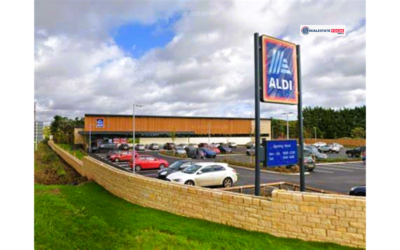

Regulations and Market Trends Fuel Potential Revival of Trump Real Estate Ventures
The Trump Organization’s real estate portfolio could experience a resurgence as shifting market dynamics and regulatory changes create new opportunities. Market experts suggest that potential updates to federal tax policies and economic recovery initiatives could benefit luxury real estate, which is a cornerstone of Trump-branded properties. Rising investor confidence in high-end real estate is also helping to shape a more favorable outlook for the company.
Demand for luxury properties, which faced setbacks during periods of economic uncertainty, has begun to rebound across major metropolitan areas. Buyers and investors are showing increased interest in premium developments as property values stabilize and rental yields remain strong. Trump-branded properties, known for their high-profile locations and upscale amenities, could become more attractive to affluent buyers seeking luxury housing and investment opportunities.
One key factor in this potential revival is the growing interest from international investors. Buyers from regions such as the Middle East, Europe, and Asia continue to see U.S. real estate as a safe and profitable investment. Trump properties, with their global name recognition and history of attracting high-net-worth individuals, are well-positioned to capture a share of this demand. Renewed marketing efforts targeting these international audiences could enhance the organization’s performance in the luxury market.
Federal regulations may also play a significant role in shaping the future of the Trump Organization’s real estate ventures. Tax incentives for developers, zoning reforms, and infrastructure investments could provide significant advantages to high-profile projects in urban areas. If policies supporting commercial real estate developments are expanded, the Trump Organization could use these changes to strengthen its presence in the market.
Commercial real estate, which saw decreased demand during the pandemic, is now showing signs of recovery. Prime office spaces, especially in cities like New York, Chicago, and Washington, D.C., are experiencing renewed interest as companies return to physical offices. Trump-owned commercial properties in these locations could see higher occupancy rates and rental revenues as businesses reestablish their operations in premium office locations.
The hospitality sector, another significant component of the Trump Organization’s portfolio, is also recovering. Hotels have seen increased bookings as business travel resumes and leisure travelers return. Trump-branded hotels, many of which cater to affluent clientele, may benefit from this trend. Additionally, the organization could explore partnerships or rebranding strategies to reach new markets and further enhance the performance of its hospitality division.
The organization has faced challenges in recent years, including declining revenues and reputational concerns due to political controversies. Properties in key markets struggled with occupancy rates and leasing activity during periods of economic slowdown. Despite these difficulties, the Trump Organization has indicated plans to adapt to changing market conditions, including modernizing existing properties and exploring new development opportunities.
Florida’s booming real estate market, where the Trump Organization owns several properties, offers a particularly promising area for growth. Migration to the state has increased significantly, driven by tax-friendly policies, economic opportunities, and warmer climates. Properties like Mar-a-Lago and other assets in the state are positioned to capitalize on this trend, particularly as demand for luxury housing remains high in the region.
International markets could also offer new opportunities for expansion. The Trump Organization’s previous ventures in countries such as Turkey, the United Arab Emirates, and Indonesia demonstrate the global appeal of the brand. Expanding into new markets with high demand for luxury real estate could allow the company to diversify its revenue streams and reduce its reliance on the U.S. market.
Regulatory conditions supporting real estate investments could create additional advantages for the Trump Organization. Federal policies that promote large-scale developments, such as infrastructure grants or low-interest loans for developers, would provide financial incentives for new projects. Combined with ongoing market recovery, these conditions could encourage the organization to pursue large-scale developments in prime areas.
While opportunities exist, challenges remain. Public perception of the Trump brand remains polarized, which could influence investor and buyer sentiment. The organization will need to navigate these reputational risks carefully while focusing on its core strengths, including its history in luxury real estate and its ability to deliver premium developments in sought-after locations.
The cyclical nature of the real estate market underscores the importance of adaptability. Diversifying its portfolio to include a mix of residential, commercial, and hospitality projects could help the Trump Organization mitigate future risks. Leveraging technology, such as digital marketing and virtual tours, could also improve customer engagement and expand the reach of its properties to global audiences.
Recent trends in the real estate market suggest that demand for high-quality developments will remain strong in the years ahead. As urban areas recover and luxury buyers seek unique and exclusive properties, the Trump Organization may have opportunities to capitalize on this growing demand. Its established presence in major cities and resort destinations provides a foundation for renewed growth and success.
Looking ahead, the Trump Organization will need to focus on innovation and strategic planning to stay competitive. Adapting to evolving buyer preferences, embracing sustainable building practices, and pursuing projects in emerging markets could help the company secure its place in the real estate industry. By addressing these priorities, the organization could position itself for a long-term resurgence in both domestic and international markets.
The combination of market recovery, regulatory support, and increased investor interest creates an optimistic outlook for Trump real estate ventures. The organization’s ability to adapt to these conditions and leverage its existing assets will determine its success in the competitive luxury real estate sector. With the right strategies, the Trump Organization has the potential to regain its prominence and remain a key player in the real estate market.




































